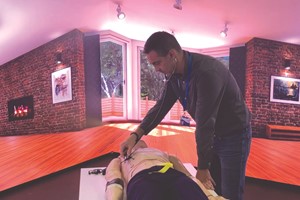In a recent study published in Radiology, a journal of the Radiological Society of North America (RSNA), researchers present compelling evidence suggesting that microwave ablation may offer a viable alternative to surgical resection in the treatment of papillary thyroid carcinoma (PTC), particularly in cases of multifocality.
PTC, the most prevalent form of thyroid cancer, often manifests with multifocality, wherein two or more nodules are detected within the thyroid gland. Traditional treatment for multifocal PTC involves surgical resection, which entails the partial or complete removal of the thyroid gland. However, surgery is accompanied by potential complications such as scarring, the need for lifelong hormone replacement therapy, and risks of permanent hoarseness or impaired thyroid function, significantly impacting patients' quality of life.
Microwave ablation, a minimally invasive procedure utilizing heat to destroy tumors, has emerged as a promising alternative to surgery for certain patients with PTC. Led by Ming-An Yu, M.D., director of interventional medicine at China-Japan Friendship Hospital in Beijing, China, the study represents the first multicenter comparative analysis between microwave ablation and surgical resection for multifocal PTC.
The study examined 775 patients with ultrasound-detected multifocal Stage I PTC who underwent either microwave ablation or surgery across 10 centers between May 2015 and December 2021. Utilizing propensity score matching to mitigate bias, researchers compared outcomes between the two groups over a median follow-up period of 20 months for the microwave ablation group and 26 months for the surgical resection group.
The findings revealed that microwave ablation demonstrated similar progression-free survival rates to surgery over a 5-year period (77.2% vs. 83.1%) while yielding fewer complications and preserving thyroid function. Notably, microwave ablation resulted in less blood loss, shorter incision length, and reduced procedure and hospitalization durations compared to surgical resection.
Moreover, complications such as permanent hoarseness (2.2%) and hypoparathyroidism (4.0%) were encountered exclusively in the surgical resection group, further underscoring the potential benefits of microwave ablation in minimizing adverse effects associated with treatment.
Dr. Yu emphasized that microwave ablation does not routinely include preventative ablation of lymph nodes, a common practice in surgical resection. Nevertheless, the study's results indicate that microwave ablation without lymph node ablation can still achieve comparable survival rates to surgical resection, marking a significant advancement in interventional thyroid cancer treatment.
The study signifies a pivotal milestone in challenging traditional treatment paradigms for multifocal PTC. Microwave ablation emerges as a promising alternative to surgery, offering comparable efficacy in terms of progression-free survival rates while mitigating complications and preserving thyroid function. As further research continues to elucidate the long-term outcomes and refine patient selection criteria, microwave ablation holds substantial potential to enhance the landscape of PTC management, ultimately improving patients' quality of life.
Microwave Ablation versus Surgical Resection for US-detected Multifocal T1N0M0 Papillary Thyroid Carcinoma: A 10-Center Study













